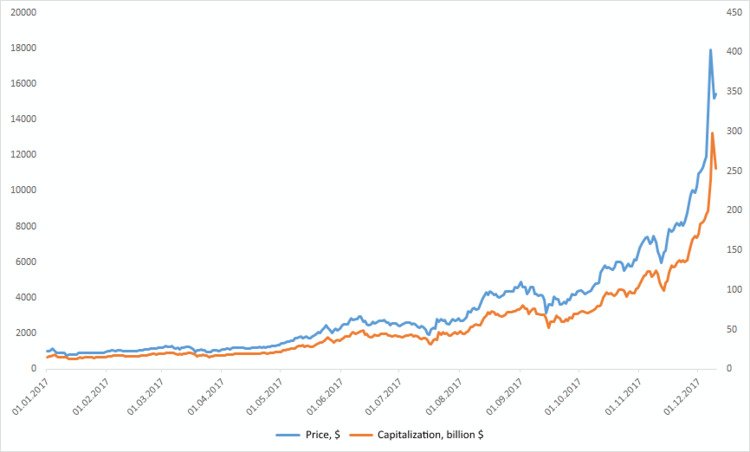Who manipulates bitcoin price?

Record growth pace
Over 11 months of 2017, bitcoin price has increased more than 10 (!) times: from $998.33 per coin as of January 1, 2017 to $10,333.60 as of November 30, 2017. Along with this, its capitalization increased from $15.49 billion to $253.78 billion. At the time of writing, the price of bitcoin was already $16694.

Pic. Bitcoin price dynamics
Source: according to Coinmarketcap.com
Many people are wondering why bitcoin costs more than one of the world's major currencies - dollar? Most experts agree that this has purely speculative basis.
Besides, to compare the cost of bitcoin and the dollar at this stage of cryptoeconomics development is incorrect, believes Dmitry Malyutin, head of marketing and business analysis department of KSK groups. "The dollar is a state-guaranteed currency and it is the essential part of the currency basket, whereas bitcoin is a hype digital product of blockchain technology. Such a rapid growth in the bitcoin exchange rate is provided, first of all, by hype in the media. The more popular the asset, the more expensive it is. This, by the way, is a direct analogy with the stars of show business - the more popular the star, the more expensive he or she is," the expert says.
What contributes to the rapid growth of bitcoin?
As professionals of the financial market believe, the excitement around bitcoin is driving power behind its exchange rate.
"Positive dynamics of the bitcoin price is provided by high activity around this cryptocurrency caused by numerous ICO, the plans of stock exchanges to launch bitcoin futures, as well as the emergence of a large number of non-core investors, who often exchange fiat savings for cryptocurrencies, thus increasing their liquidity on the market," said the founder of the blockchain platform FREED Eugeny Glariantov.
At the moment, the following situation is observed: the higher the price of bitcoin, the hotter this topic is discussed in the media and social networks, and the more attention it attracts to itself. New attention in turn generates new investors, and consequently, increases the demand, and thus its price.
Stepan Morozov, Senior Researcher at RANEPA, emphasizes that all investors in bitcoin are motivated by purely speculative interest. "I would also like to note that no one, no bank will undertake to cash out, for example, $30 million in bitcoins. Everyone needs money, not bitcoin. Bitcoin may be accepted in some places as a means of payment, but still, people need money. And banks do not want to cooperate, because there is a risk of money laundering," the expert comments.
In addition to the excitement around the price of bitcoin, the following factors influence according to experts:
- limited supply of bitcoin. In total only 21 million units can be produced. The idea that there is not enough bitcoins for all is heating up demand and thus stimulates the growth of the bitcoin exchange rate;
- cost of production equipment and electricity for mining. Specialists point out that it is becoming increasingly expensive to mine bitcoins. According to forecasts, in the near future only very large players with turnover of 10 million dollars a month will remain in the mining business. They will spend very large resources on production, which automatically increases the cost of bitcoin. However, now there is an opposite situation in mining: once a major mining pool "drops" the produced coins onto the market, their price immediately goes down, as the offer increases;
- recognition of bitcoin by official regulators and their introduction into payment services, traditional exchanges. The more countries, companies and other economic agents will recognize bitcoin as a means of payment, the more expensive it will be, since the demand for it will automatically increase.
As a result, we can conclude that bitcoin's exchange rate is manipulated only by people's thirst for a record return on investment in a short time. How will the value of BTC grow further and when it reaches its ceiling, it's difficult to assess, but many experts are sure that this day will come soon.